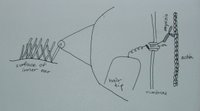 Here's the set up of your inner ear. The tiny little hairs (cilia) in your ear each have a tiny spring attached to the top. When the hairs move around, due to sound waves, the spring stretches, and pulls open an ion gate on a neuron. Ca2+ flows in, and an impulse is sent to your brain, and you hear a noise.
Here's the set up of your inner ear. The tiny little hairs (cilia) in your ear each have a tiny spring attached to the top. When the hairs move around, due to sound waves, the spring stretches, and pulls open an ion gate on a neuron. Ca2+ flows in, and an impulse is sent to your brain, and you hear a noise. (like this picture shows)
(like this picture shows) If the sounds you are hearing are too loud, or too soft, your inner ear makes an adjustment. The end of the spring is attached to that critical ion gate, right? So depending on how far away the tip of the hair is from the ion gate, there will be different tension in the spring, and it will take different amounts of force from sound waves to cause the ion gate to be pulled open.
If the sounds you are hearing are too loud, or too soft, your inner ear makes an adjustment. The end of the spring is attached to that critical ion gate, right? So depending on how far away the tip of the hair is from the ion gate, there will be different tension in the spring, and it will take different amounts of force from sound waves to cause the ion gate to be pulled open.Your body takes advantage of this. When it's really loud, your body moves the ion gate closer (by way of myosin and actin) so that only a HUGE, powerful sound wave can put enough tension on the spring to cause you to hear. This is why you go deaf after a party or a rock concert. If it's really quiet, your body increases the tension in the spring by moving the ion gate far away, so a tiny force is enough to trigger hearing. That's why you hear so well in the morning!

No comments:
Post a Comment